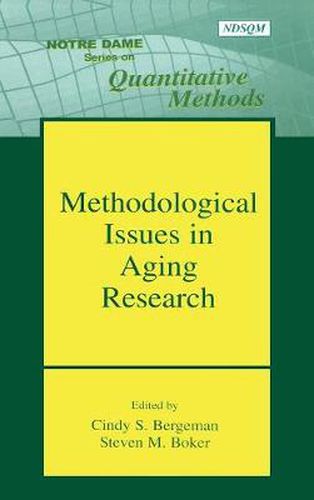Readings Newsletter
Become a Readings Member to make your shopping experience even easier.
Sign in or sign up for free!
You’re not far away from qualifying for FREE standard shipping within Australia
You’ve qualified for FREE standard shipping within Australia
The cart is loading…






Methodological Issues in Aging Research is the first volume in the Notre Dame Series on Quantitative Methodology. This new series provides practical training and exposure on a specific area of quantitative methodology to allow for accelerated use. This book reviews several new aging research techniques, including dynamical systems analysis, structural equation modeling, multilevel modeling, and longitudinal behavioral genetic designs to help disentangle the dynamic pattern of genetic and environmental influences. Recent advances in dynamical systems have provided methodological tools to partition components of intraindividual variability to intrinsic dynamics, extrinsically coupled dynamics, and error. These new techniques provide several benefits: better estimates of the direct effect of environmental or treatment effects; more precise predictions of outcomes which in turn increase the diagnostic power of test instruments; and the potential for developing new treatments that take advantage of the intrinsic dynamics of the course of a disease or age-related change to enhance treatment. Methodological Issues in Aging Research appeals to advanced students and researchers in gerontology, health psychology, and other fields related to aging research. It can be used as a main or supplemental text for advanced courses related to aging research.
$9.00 standard shipping within Australia
FREE standard shipping within Australia for orders over $100.00
Express & International shipping calculated at checkout
Methodological Issues in Aging Research is the first volume in the Notre Dame Series on Quantitative Methodology. This new series provides practical training and exposure on a specific area of quantitative methodology to allow for accelerated use. This book reviews several new aging research techniques, including dynamical systems analysis, structural equation modeling, multilevel modeling, and longitudinal behavioral genetic designs to help disentangle the dynamic pattern of genetic and environmental influences. Recent advances in dynamical systems have provided methodological tools to partition components of intraindividual variability to intrinsic dynamics, extrinsically coupled dynamics, and error. These new techniques provide several benefits: better estimates of the direct effect of environmental or treatment effects; more precise predictions of outcomes which in turn increase the diagnostic power of test instruments; and the potential for developing new treatments that take advantage of the intrinsic dynamics of the course of a disease or age-related change to enhance treatment. Methodological Issues in Aging Research appeals to advanced students and researchers in gerontology, health psychology, and other fields related to aging research. It can be used as a main or supplemental text for advanced courses related to aging research.